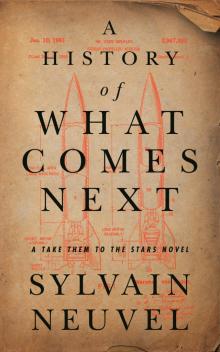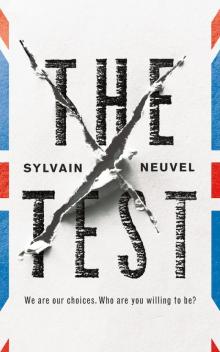- Home
- Sylvain Neuvel
Waking Gods Page 2
Waking Gods Read online
Page 2
I know everyone is worried about me. My mother told me she would pray for me. You don’t do that for someone who’s doing great. I didn’t want to upset her, so I said thank you. My faith has never been really strong, but even if it were, I know there’s no God coming to help me. There’s no redemption for what I’ve done. I should be dead. I died. I was brought back by what I assume is advanced technology, but you might as well call it witchcraft. Not too long ago, the Church would have burned someone like me.
I may believe in God, but I’m at war with him. I’m a scientist, I try to answer questions, one at a time, so there’s a little less room for Him as the answer. I plant my flag, and inch by inch, I take away His kingdom. It’s odd, but none of this has ever occurred to me before. I never even saw a real contradiction between science and religion. I see it now, I see it clear as day.
I’ve crossed that line we’re not supposed to cross. I died. And I’m still here. I cheated death. I took away God’s power.
I killed God and I feel empty inside.
FILE NO. 1408
INTERVIEW WITH BRIGADIER GENERAL EUGENE GOVENDER, COMMANDER, EARTH DEFENSE CORPS
Location: Waldorf Astoria Hotel, New York, NY
—You should hurry, Eugene.
—How long have we known each other?
—Fourteen years this September.
—Fourteen years. And in all that time, have I ever, once, given you permission to call me Eugene?
—“General” seems … inappropriate after what we have been through.
—It does, doesn’t it? Imagine how it feels to have absolutely nothing to call you.
—Not that I do not enjoy hearing you ramble endlessly about my anonymity, but you are addressing the United Nations General Assembly in less than one hour. I know how much you loathe speeches, so if you require my help, now would be a good time.
—Then why don’t you give the address? You’re the one who got me into this mess in the first place.
—Let me hear your opening.
—Where’s that damn piece of paper? Oh, here it is. Have you seen my—
—They are on the nightstand.
—Thank you. It goes like this: “I know many of you are afraid. I know you want answers.”
—I meant what is the beginning of your speech?
—That is the beginning of my damn speech.
—Eugene, you are not talking to cadets at the academy. This is the UN General Assembly. There is protocol. You normally begin by naming everyone. Mr. President, Mr. Secretary General, members of the General Assembly, ladies and gentlemen.
—Fine. I’ll start with that, then I’ll say “I know many of you are afraid. I know you want answers.”
—No, you have to say something profound first, something inspiring.
—Something inspiring? There’s a giant goddamn robot in the middle of London. What people want is for me to get rid of it. There’s nothing profound about that.
—Then say something completely unrelated but profound. The last address I heard in person was from a US President. He said something like: “We come together at a crossroads between war and peace; between disorder and integration; between fear and hope.”
—Very well then. Mr. President, Mr. Secretary General, members of the General Assembly, ladies and gentlemen. Those of you who know me know I am a man of few words. Those who know me well also know how much I loathe speeches. So with your permission, I will steal my opening remarks from a former president of the United States. He said: “We come together at a crossroads between war and peace; between disorder and integration; between fear and hope.”
—That is—
—I was joking. I have a quote from another fellow who had a better way with words, I can just move it up. After that, you’ll have to settle for some words of my own. His name is Thomas Henry Huxley. He was a scientist in the early days of modern biology. He said: “The known is finite, the unknown infinite; intellectually we stand on an islet in the midst of an illimitable ocean of inexplicability. Our business in every generation is to reclaim a little more land.” Almost a decade ago, when Themis was revealed to the world, we realized that ocean was a lot bigger than we thought, and what transpired this morning in London has made our islet of certainty feel so small that we may wonder if we even have enough room to stand on.
Now can I say it?
—I know many of you are afraid.
—Don’t make fun of me.
I know many of you are afraid. I know you want answers. Let me be blunt, I don’t have the answers you’re looking for. Not today. I also have a confession to make. I … am also afraid. I’m afraid because I don’t know what that thing is, or what it wants. I don’t know if there are more coming and I really don’t know if we could do anything about it if there were. There is a lot we don’t know. A little bit of fear is only healthy if you ask me.
—How reassuring. I feel better already.
—We can’t let fear stop us from doing what we must do. We also can’t let fear dictate our actions. We must exercise patience. What we’ve got here—
—What are you trying to say?
—That everyone should wait before doing something really stupid.
—Such as?
—You know that there are those in England who want a show of force. I also know that NATO is considering military action of its own. I want everyone in that room to use their influence. I want them to use every means at their disposal to make sure that doesn’t happen.
—Why?
—You know why! This second robot is probably even more powerful than Themis. It’s doubtful that British ground forces could put a scratch on it. And this is London. In an urban environment, there is simply no way to concentrate enough firepower with a ground assault. An all-out air strike has more potential, but we’d need a joint operation between our biggest air forces. We’d also level the city of London. If that doesn’t bring the robot down, a high-yield nuclear bomb would be our best, and last, option, though it would mean relocating most of England’s population after the fact. Is that clear enough for you?
—If that is what you want people to leave with, then you should say it like that, in those words. Make them understand there is no “best-case scenario” if they attack, that they cannot “bluff” their way out of this.
—You don’t think it’s a little rough? You asked for profound and inspiring.
—You open with profound and inspiring so that, twenty years from now, people can feel clever quoting you around the dinner table. If there is something you want people to understand today, say it like you are addressing your grandchildren. Half the people in that room will hear you through an interpreter, and most have the attention span of a five-year-old. When they leave the room, these people will call home. They will probably talk to their defense ministers, their top generals, their chiefs of staff, people with an army at their disposal who are itching to use it. You are asking them to trust a group of scientists before their own military advisors. Make sure the reason for that is not lost in translation.
—I had another paragraph that made me sound reasonably intelligent.
—Let me hear it.
—What we’ve got here is not a London problem. It is not a British or a European problem. It’s certainly not a NATO problem. What we’ve got here is an Earth problem. It’s a problem for all of us, for every nation represented in this room, and we must find a solution to it, together. This institution was founded in the wake of the most devastating war in human history, to promote peace by allowing nations to resolve their disputes here, in this room, and not on the battlefield. It was also created so that we could pool our knowledge and resources and achieve great things none of us could dream of achieving on our own. Today we have a chance to do both: prevent war of a level we’ve never imagined and bring humanity to a whole new frontier. If the
re has ever been a time for the United Nations, it is now. If there has ever been a reason for the EDC, this is it.
—Put that at the end for when they have stopped paying attention. For now, you should talk about your military career so they can relate.
—I say a few words somewhere … Here … I also know many of you have doubts. The decision to create the EDC was not a unanimous one. Why should you trust the EDC and not your own military? That is probably the only question I can answer today. I’m a military man, have been for over forty years. I can tell you this: Military people need intelligence …
—You need to say more than that. Tell them about how many wars you have been in, how many people you killed. Make them see the blood. Make them think of you as a warmonger who would drop a bomb on London at the first excuse. Only then will they believe you when you tell them they should not.
—What can I say? I am a Brigadier General in the South African Army and Commander of a UN military force. In South Africa, I was in charge of the Army Armour Formation, that’s a hard-to-pronounce way of saying lots of tanks. I fought in a segregated unit during the Border Wars, I have been part of peacekeeping operations in Sudan, I have led forces for the UN Intervention Brigade in the Democratic Republic of Congo. I have been in one army or the other for all of my adult life—
—Perfect.
— … and I can tell you this: Military people—people like me—need intelligence to be useful. We need to know what’s going on. Without intelligence, take my word for it, you do not want your fate in the hands of the military. We do not improvise. We’re like an elephant in a china shop, we can make a big mess of things if you have us chasing our tail.
I am also the Commander of the Earth Defense Corps, technically another military force with a single, gigantic weapon. As Commander, I have two soldiers under my command. Make that one soldier. The other is technically a Canadian consultant. I also have sixty-eight scientists working for me. They didn’t exactly phrase it like that when they offered me the job because they know I don’t like scientists. Scientists are like children: They always want to know everything, they all ask too many questions, and they never follow orders to the letter.
That, people, is the EDC. A big robot, one soldier, a linguist, and a whole lot of disobedient children. What we need, what the world needs right now, is them, my insubordinate kids. They know more about alien technology than anyone on Earth and they’re learning more every day. That is what they do, they learn things, constantly. They claim land for our little island of knowledge so that we can have room to breathe.
—Touching.
—I remembered the speech you gave me when you tried to sell me this job the first time around.
—You said no.
—I did, but it was a good speech. Then I have a few paragraphs about what we know, mostly about what we don’t know.
—What do we know?
—Not much. Here’s what I have.
We’ve only had a few hours to look at the data that’s available, and our people haven’t been onsite yet, so this is what we know. The figure in London is roughly ten feet taller than Themis, and about 10 percent more massive. We’re calling it Kronos. That’s it. The rest is conjecture.
There might be no one in that big metal man. It might be remote-controlled, it might not even be a robot; it hasn’t moved since it arrived. We feel this is rather unlikely, but it’s not something we can blindly discard as an option. There might also be humans in there. That would mean another robot was buried somewhere and was discovered by one of the nations represented here today. That also seems unlikely but not impossible.
Given what we know about Themis, the most probable scenario is that there are two or more alien pilots on board, and since the figure in London looks a hell of a lot like Themis, our working assumption at this point is that it was built by the same race. That doesn’t necessarily mean that we are dealing with the people who built Themis. They left one giant robot on this planet, it stands to reason they could have done the same thing on another inhabited planet, and it might be these people visiting us. Like I said, we don’t know much.
Assuming we are in fact dealing with aliens, they might be friendly. They didn’t come out guns blazing—that’s usually a good sign—and our current theory about Themis is that she was left here for us to defend ourselves. Their intent might very well be hostile. It would be odd for a foe to give us this much time to prepare, but its presence might be a prelude to a full-scale invasion or attack. Another very reasonable explanation, the one we’re leaning towards, is that they’re still trying to figure us out. They would have no way to know whether we mean them any harm or how we’ll react to their presence.
But enough speculation. All I can offer you right now is a lot of ifs and maybes. I was asked to come here and make a recommendation. For now, it’s a very simple one: Send Themis to England, that will take seven or eight days. Let my kids do their job for another week and we’ll reconvene. In the meantime, I will ask, implore all of you to exercise restraint and let this process take its course. This is not the time for impulsive action, no matter how tempting it might be.
That’s it. That’s my speech. Is that long enough?
—It will do just fine.
—Of course, it didn’t help that I had to write a whole new one for the press corps after Rose lost her goddamn mind.
—What did she do?
—You missed that? She went on television and told the whole world we shouldn’t be involved.
—Who is we?
—The EDC. She said sending Themis would be our biggest mistake. I know you like her, but you know she hasn’t been thinking straight. That girl is hanging on by a really thin thread.
—She has been through some … unsettling events.
—I get that. What I don’t get is why you put her in charge. She could have been on the team without running the show, you know. She doesn’t like me because I’m the big bad military, but what she’s doing really isn’t helping. Sending Themis over there is the only way I can buy some time. Without that, there’ll be troops in Regent’s Park by morning, and we both know how that’ll end.
—Let me hear it.
—What?
—What you prepared for the press corps.
—Fine. You may have heard the Head of our Science Division, Dr. Rose Franklin, speak to the media this morning. She had a lot to say, but, to summarize, Dr. Franklin believes we should do nothing, send no one, not even the EDC, and hope that the robot eventually leaves of its own accord. Dr. Franklin is a brilliant scientist and she is certainly entitled to her opinion, even if she doesn’t speak for the EDC. As you may know, Dr. Franklin was almost killed in an accident involving Themis in Colorado, and I believe the incident has left her unnecessarily cautious. While I disagree with her conclusion, she did say a lot more than “we shouldn’t send the EDC.” She made a few good points this morning.
We’re making first contact with an alien species. No matter how it goes, this will be a defining moment in human history. We should all stop for a minute and realize how significant and far-reaching these events are.
With that in mind, Dr. Franklin pointed out that sending an armored division and a few thousand armed soldiers is probably not the best way to make a good first impression. I find it hard to disagree.
She did suggest that sending Themis would be an even bigger mistake. Tanks and foot soldiers might be perceived as a sign of aggression, but they would most likely pose no serious threat to the robot if it’s anything like ours. Themis, on the other hand, could possibly give ’em a run for their money. I believe that showing the aliens a familiar face might be a good way to open a dialogue, but there is an argument to be made that sending the only thing on this Earth that could hurt these guys might not be such a great idea.
—Concise. Decisive, yet supportive. I like it. Grab your jacket.
It is time to go.
—Do you remember what you told me the second time around to get me to take this job?
—I do.
—You said: “I found you a military post where you’ll never have to kill anyone ever again.”
—I know. I still intend to keep that promise.
FILE NO. 1416
INTERVIEW WITH CAPTAIN KARA RESNIK, EARTH DEFENSE CORPS
Location: Somewhere in the Atlantic
—Good morning, Ms. Resnik. I hope I did not wake you.
—Holy shit! No! I just got out of the shower. I was running laps on top deck. Why does it feel like we haven’t talked in a decade?
—It has been eight years since our last conversation. Can you talk?
—You mean can anyone hear me? I doubt it, Vincent’s still asleep in his bunk.
—I meant are you busy?
—I missed this.
—What?
—This!
— …
—No, I’m not busy. I have time to talk.
—Where are you?
—In the middle of the Atlantic, but you know that already.
—I meant on the boat.
—In our quarters. We have a little … It’s like a very, very small apartment. We have a couch, a TV, kitchenette.
—I am pleased to hear that you are comfortable. I requested some amenities when the UN acquired your vessel. I know how much you disliked the previous one.
—Oh, it’s night and day, sir. The boat we took before was carrying grain, we were like stowaways. This one’s been overhauled just for us. It doesn’t do anything else. We still sleep in bunk beds though I’m not sure why that is. How’ve you been? I bet you’re bored out of your mind without us.
—Believe it or not, there are things in the world that do not revolve around you. Not many, but enough to keep me reasonably occupied.
—I was just asking how you were. I haven’t talked to you in eight years!

 Only Human
Only Human Waking Gods
Waking Gods Sleeping Giants
Sleeping Giants A History of What Comes Next
A History of What Comes Next Only Human_The Themis Files
Only Human_The Themis Files The Test
The Test